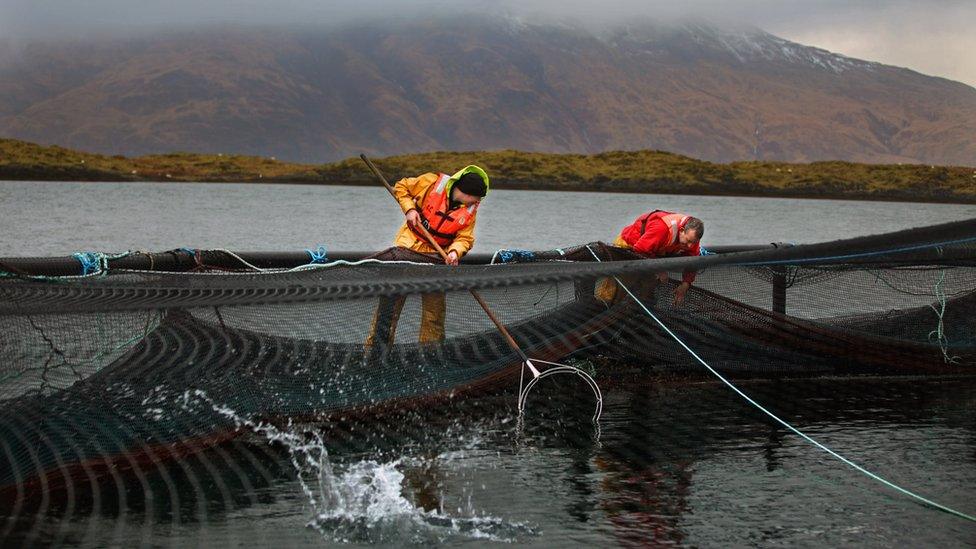AirBnB: A freshen-up for virtual neighbours
- Published

Short term lets of property have boomed in recent years, and are seen as worsening conspicuous pressure points in rural and urban Scotland.
Housing shortages, noisy neighbours and safety have become a pressing concern for some.
But online lets are good news for the tourism industry, and for household income.
A Scottish government consultation has been asking how to better regulate the sector, with pressure from landlords not to use "a sledgehammer to crack a nut".
It's the height of the tourist season. English schools have joined Scottish schools on holiday.
Anyone waiting to decide on their destination may be encouraged by the burst of heat to stay in the UK, as if the exchange rates for sterling were not reason enough.
So it's peak season for concern about "over-tourism" - the notion that we can have too much of this good thing. While we want to welcome visitors, goes the argument, there are either limits to our hospitality, or the crowds and congestion make for a declining quality of experience for those who visit.
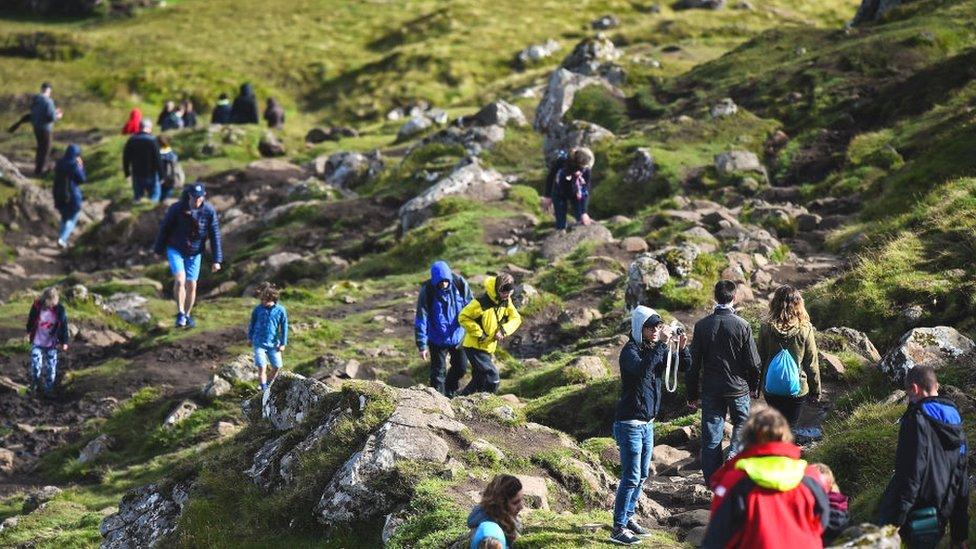
It is the peak season for concern about "over-tourism" in Scotland
Today sees the close of a Scottish government consultation on what has become one of the most conspicuous pressure points - the sharp growth in short term lets.
It's widely perceived as the problem of AirBnB, though I'm obliged to point out that other online short-term letting brokerages are available.
For most of us, AirBnB is not a problem at all. On the contrary, it's an opportunity to travel with more flexibility, often at lower prices, with a closer sense of the people and the culture being visited. It cuts out many layers of travel brokerage and cost.
Its original role as an online shop for sofa surfers gave way to letting out a spare room, perhaps while a family member was away at university, to help offset that cost. And then it allowed many more people to let out their home while they're away from it.
At astonishing speed, this classic case of a disruptive technology has opened up investment in properties that are solely intended for the short-term let (STL) market. The income for part of the year can make a holiday home affordable, thus pushing up the cost of properties in the second home bracket.
Croft caravan
Scotland is now one of the countries with hot spots of AirBnB activity that have forced the Scottish government to act. The first minister made it one of the stand-out pledges in a recent SNP conference speech. For some, this has become a big and pressing issue.
The two areas best known to face this pressure are Skye and Edinburgh, with very different profiles for the problems caused. Skye has long had housing pressures exacerbated by second homes.
But at least seasonal workers in hotels, restaurants and bars used to be able to rent somewhere, even if it was a caravan on a croft. Less so now.
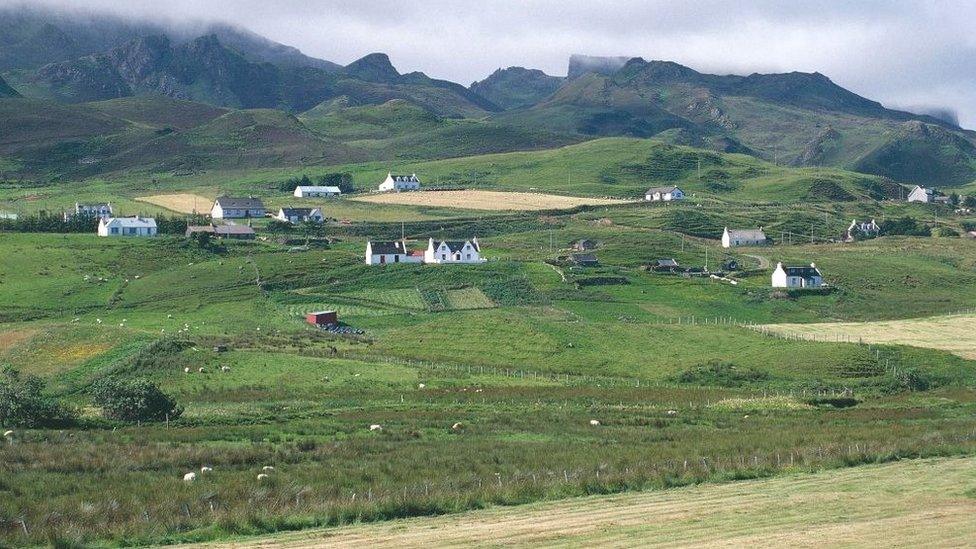
Skye has long had housing pressures exacerbated by second homes
Rural hoteliers tell me their recruitment problems are worsened because every available space is available for short-term lets, because AirBnB doesn't set a minimum standard but allows for every segment of the market.
Thus, the cost of employment goes up, and the margins for sometimes precariously seasonal businesses become alarmingly thin.
This isn't just about Skye. On a recent visit to east Ross-shire and the Black Isle, I heard growing talk of the impact of AirBnB. In Cromarty, for instance, which has developed as a thriving village community within commuting reach of Inverness, it is reckoned that 50 homes are not occupied permanently.
Second and holiday homes were already an issue, but with AirBnB, it looks to make second homes more financially viable, and therefore more of a housing pressure.
David Ross, a retired journalist colleague in the village, who sits on the local community trust, and used to chair the school board, says the cost of housing for young families means that the primary has gone from 90 pupils to below 50 in his 30 years there. The school could lose another teacher, and looks all the more vulnerable for it.
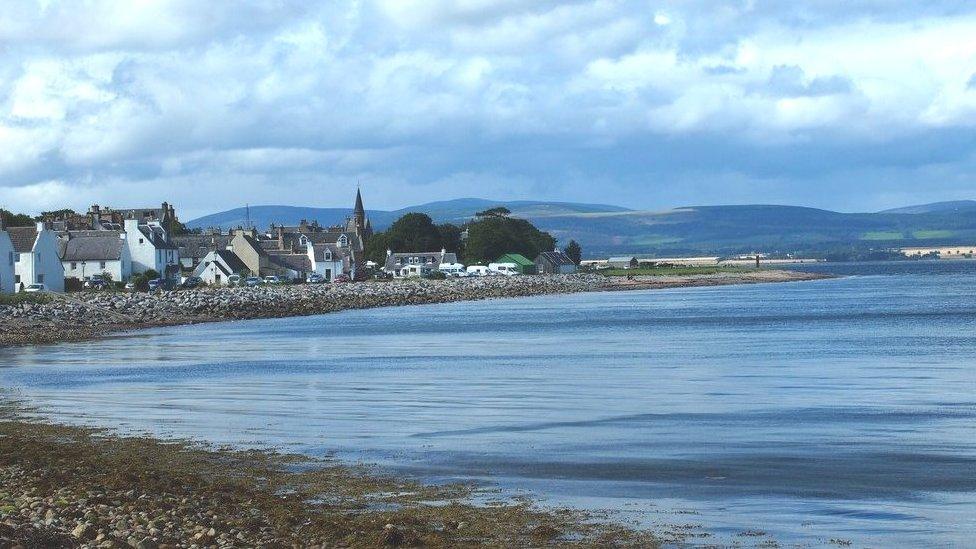
In the village of Cromarty, it is thought that 50 homes are not occupied permanently
Edinburgh has parallel problems of rising housing costs, though it's not clear in either case that short-term lets have to take all the blame. The capital's property market has been heating up in recent years anyway - a far cry from the concerns of economic collapse that accompanied its twin bank meltdown 10 years ago.
In the city centre and in the north of the city towards Leith, short-term lets are blamed for undermining community cohesion and making tenement life unbearable for some. There's a visible presence in the key boxes, unlocked by code, padlocked to railings near the each property. In planning speak, it's 'a loss of amenity'.
Strangers
I heard, for a recent report on Good Morning Scotland, from Deirdre Henderson, one of those co-ordinating a new pressure group pushing back at the growth of AirBnB. Her family had a tenement flat in the Powderhall area of Edinburgh.
The flat downstairs was stripped of much of its interior decor, making any activity echo more loudly than it would do in a normally furnished home.
It typically slept more people than a normal flat would have, as bookings were used for parties, with costs widely shared. Several times each week, there would be different strangers using the stair, which made Deirdre worry for the safety of herself and her children.
"It can make you feel very low in a place that should make you happy and secure," she says.
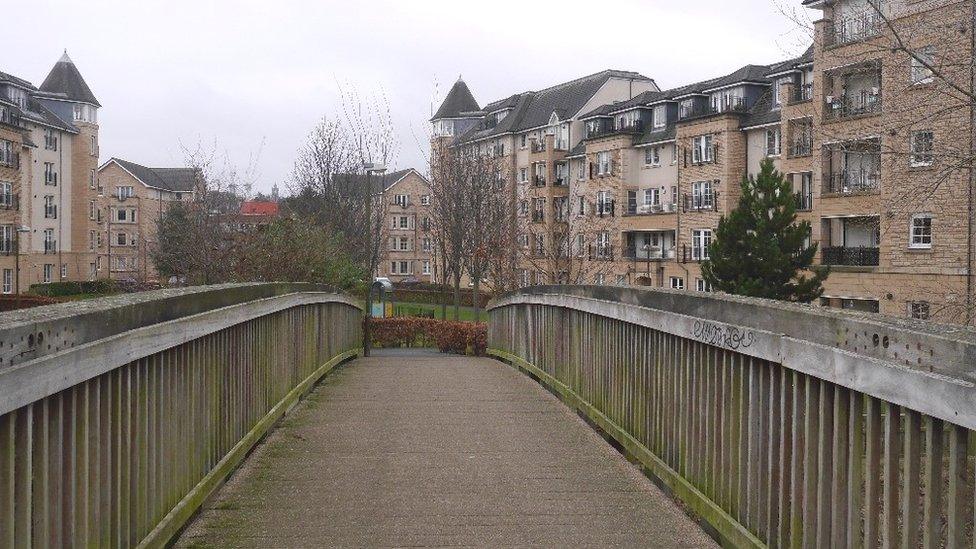
For some, it is impossible to find out who the owner of the property is, so they can be informed of the nuisance caused. For others, the owner becomes aware of complaints to the city council, and makes an intimidating appearance at the front door.
This is in the past tense, because Deirdre and her family moved. Soon after, the owner of the downstairs flat sold up. She reckons they had had enough of the complaints she was making. If there's hassle for "normal" occupants of tenement flats, there can be hassle too for owners.
AirBnB makes some effort to rein in unwelcome behaviour by guests, removing or suspending landlords from its platform if there are multiple complaints.
An enforcement order by a council can be served for a number of reasons, including anti-social behaviour, and after that, the property ceases to work as a business proposition. Deirdre Henderson's complaint about Edinburgh Council is that it was inadequately resourced with staff to enforce the enforcement notices.
Sledgehammer
Could that be the plight of all short term lets - that the law is changed to enforce a tough regime in planning, the use of properties, licensing, regulation and taxation?
Those are among the questions being asked in the St Andrew's House consultation, which has been extended as a result of bringing in an unusually high number of responses.
It raises an unusually wide-ranging set of issues: housing, tourism, business rates and rates relief, safety, the capacity for council enforcement, local pressure points and the interests of the formal hospitality sector. It pits the desire for a stronger tourism sector, and a thriving private rented property market with, on the other hand, the issues of housing availability and cost, in rural and urban areas, and the community cohesion in tourist-heavy pressure points.

While stories such as Deirdre Henderson's are not difficult to find, landlords and those who rely on short-term lets have been fighting a fierce defensive action to ensure the consultation does not lead to "a sledgehammer to crack a nut".
That's the fear of Fiona Campbell, who leads Scotland's short term letting association. For her, ownership of a small number of homes for holiday lets is a legitimate small business, deserving of respect like any other. These lets are not run as merely a hobby or some extra income for the already well-off.
And the economic impact is substantial. AirBnB, by no coincidence, recently issued figures for 2018 that showed owners of Scottish properties who let through the website took £162m from doing so.
They assume every visitor to such a property goes out and spends £100 per day on food, drink, entertainment and visitor attractions, so the value spirals up to nearly £500m. A number like that is not one that ministers, in responding to the consultation, can simply ignore.
Festival lets
Fiona Campbell pushes back at each of the claims being made by those pushing for tighter regulation on STLs.
On claims that it's taking away scarce housing from local people, she counters that councils and central government should have been building or allowing more social housing. Some 79,000 homes are reckoned to be lying empty - though not necessarily in the locations visitors might want to rent, let alone homeless people.
On claims that whole tenement blocks have been changed for the worse, Fiona, says complaints are there but the numbers are low, the data isn't clear, and policy should not be set until it is.

If it's true that there are more than 12,000 AirBnB properties in Edinburgh - half of the Scottish total - they are not all rented all of the time. Some may be a room in a house or flat, some may be let once or twice a year. Around 60% of Edinburgh listings in Edinburgh were for fewer than 30 days last year.
On that, Deirdre Henderson and Fiona Campbell can agree - that people should have a right to let out their home to make some extra income from it, for at least a short time each year - say during the Edinburgh festivals or when the owners are on holiday.
They can also agree on the need for registration, and an effort to ensure that renters are aware of obligations on visitor safety, including hard-wired smoke alarms. There's also a concern that many STL landlords lack public liability insurance, and have mortgage or household insurance policies that do not cover their leasing activities.
Where Deirdre and Fiona diverge is what happens after a month of letting, and particularly if there are numerous turnovers.
City of Edinburgh Council offered its own views to the Scottish government, in a submission published at the end of last week. It has resisted advice to follow the example of Glasgow, in interpreting planning law in such a way that it can and does clamp down on short term lets.
The capital's council cites figures about those not living in a property while renting for more than 90 days a year, at which point the home has probably ceased to be anyone's home.
Bolted
Edinburgh council wants a licensing regime. That's because the planning route to reform has been closed off, for now at least.
Any hopes from campaigners that a much tougher regime on planning controls could be introduced to tackle STLs were dashed in the complex voting frenzy at Holyrood that saw amendments decided on what is now the Planning Act 2019.
The Greens' Andy Whiteman pushed for a change that would require anyone running such a business to have the property recognised as such within planning law.
It was defeated in favour of an amendment backed by Conservatives that allows councils to impose a licensing regime, but only in housing pressure spots. For that, the more detailed legislation had already been put in place, to deal with high rental costs.
So if not planning, registration seems the least that can be expected, and possibly licensing. That's until technology brings along the next disruptive website.
"The horse has bolted," says Fiona Campbell. "Now, we need to train the horse."
- Published9 July 2019

- Published20 May 2019

- Published27 November 2018
